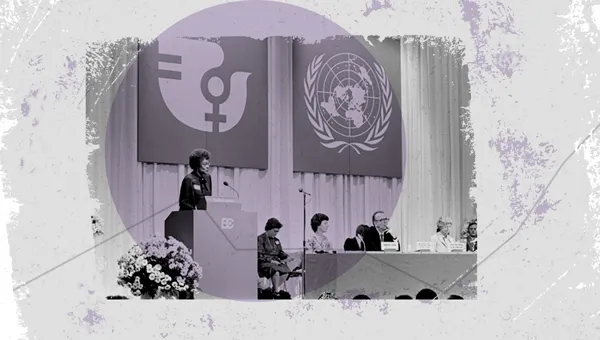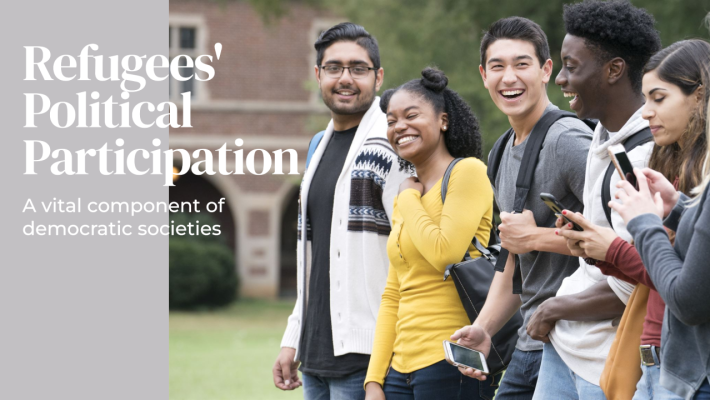Gender equality, women’s rights and participation with different view

Introduction
Gender equality and women’s rights have been critical issues in modern society for decades. The empowerment of women is essential for building a just and equal society. However, the journey towards gender equality has been long and arduous. It has taken several decades of activism, advocacy, and policy changes to create a more equitable and just society and support the women’s participation in the political decision-making process, and their involvement in peacebuilding efforts.
Women’s participation in decision-making processes and their involvement in peacebuilding efforts have gained significant attention in recent times. The topic has become more important, particularly as young men and women view it differently from previous generations. This article examines how young men and women view gender equality and women’s rights, their participation in political decision-making processes, and their involvement in peacebuilding efforts.
Gender Equality and Women’s Rights
Gender equality is the belief that all people should be treated equally, regardless of their gender. Women’s rights refer to the entitlements and freedoms that women have in society. Young men and women have different views on gender equality and women’s rights.
Young men and women view gender equality and women’s rights differently depending on their cultural, social, and economic backgrounds. In some societies, gender equality is a taboo subject, and women’s rights are severely restricted. In contrast, in other societies, women enjoy more freedom and rights. In general, young men and women tend to support gender equality and women’s rights, although the extent of their support varies.
Young women are more likely to support gender equality and women’s rights than young men. This is because young women are more likely to experience gender-based discrimination and inequality. They face challenges such as gender-based violence, discrimination in education, and employment, and restrictions on their reproductive rights. These experiences make young women more aware of the need for gender equality and women’s rights.
A study conducted by the World Values Survey in 2019 found that 65% of young women aged between 18 and 29 believe that gender equality is important, compared to 57% of young men. Similarly, 61% of young women support women’s rights, compared to 51% of young men.
The study also found that young women are more likely to support gender equality in the workplace, education, and politics. For example, 75% of young women believe that women should have equal opportunities in the workplace, compared to 67% of young men. Similarly, 74% of young women support equal opportunities in education, compared to 66% of young men. In politics, 72% of young women believe that women should have equal opportunities to men, compared to 63% of young men.
Young men, on the other hand, tend to support gender equality and women’s rights, but to a lesser extent. This is partly because they have not experienced the same level of discrimination and inequality as young women. Moreover, some young men may feel threatened by the idea of gender equality, as it challenges traditional gender roles and may require changes in social norms.
Young men and women can support gender equality and women’s rights in various ways, such as:
- Educating themselves and others about the importance of gender equality and women’s rights.
- Challenging gender stereotypes and promoting gender equality in their daily lives.
- Advocating for policies and laws that promote gender equality and women’s rights.
- Supporting women’s organizations and initiatives that promote gender equality and women’s rights.
- Having a multi-pronged approach that includes legal and policy reforms, education and awareness-raising, and the promotion of women’s participation in decision-making processes.
In many societies, women continue to face significant challenges in realizing their rights and achieving gender equality. Despite progress in some areas, women continue to experience discrimination and inequality in various areas, including education, employment, health, and political participation. For instance, globally, women make up less than a quarter of parliamentary seats, and women hold only 24% of senior management positions.
In many countries, women face restrictions on their reproductive rights, including access to contraception and safe abortion services. Gender-based violence is also a significant challenge, with millions of women experiencing physical or sexual violence each year.
Women’s Participation in the Political Decision-Making Process
Women’s participation in the political decision-making process is critical for achieving gender equality and women’s rights. When women have a voice in policymaking, they can advocate for policies that address the specific needs and challenges facing women. Women’s participation in politics can also challenge gender stereotypes and promote the idea that women are capable leaders. Young men and women have different views on women’s participation in politics.
Young men and women view women’s participation in the political decision-making process differently. Young women tend to support women’s participation in politics and advocate for greater representation of women in political leadership roles. They recognize that women’s voices are essential in policymaking, and that women’s experiences and perspectives can inform policies that benefit everyone.
Young men, on the other hand, may not see the need for greater representation of women in politics. They may view politics as a male-dominated field and see women’s participation as an attempt to challenge traditional gender roles. However, as more women become involved in politics and hold leadership roles, young men may become more accepting of women’s participation in the political decision-making process.
Young women are more likely to support women’s participation in politics than young men. A study conducted by the European Union in 2019 found that 58% of young women aged between 16 and 30 believe that women should be represented equally in political decision-making, compared to 45% of young men.
The study also found that young women are more likely to vote than young men. In the 2019 European Parliament elections, 57% of young women aged between 18 and 24 voted, compared to 49% of young men.
However, women’s participation in politics is still limited. According to the Inter-Parliamentary Union, women make up only 25.5% of national parliamentarians worldwide. In addition, women are underrepresented in political leadership positions. In 2019, only 10 women were serving as Head of State and 13 as Head of Government.
Women’s participation in the political decision-making process can be supported in various ways, such as:
- Encouraging women to run for political office and supporting their campaigns.
- Advocating for policies and laws that promote women’s political participation, such as gender quotas and affirmative action.
- Challenging gender stereotypes and promoting the idea that women are capable leaders.
- Supporting women’s organizations that promote women’s political participation and leadership.
Peacebuilding Efforts
Women’s involvement in peacebuilding efforts is crucial for achieving sustainable peace and development. Women have a unique perspective on conflict and its impact on their communities, and their participation can ensure that the needs and perspectives of women are taken into account in the peacebuilding process. When women are involved in peacebuilding efforts, they can contribute to policies and decisions that address the root causes of conflict and promote reconciliation.
However, women’s involvement in peacebuilding efforts is often limited or non-existent. According to the United Nations, women make up only 13% of negotiators in peace processes globally.
Peacebuilding is another critical aspect of achieving gender equality and women’s rights. Women’s involvement in peacebuilding can help to ensure that the needs and concerns of women are addressed in post-conflict situations. It can also help to reduce gender-based violence and discrimination.
However, women are often excluded from peacebuilding efforts. According to the United Nations, women make up only 9% of negotiators and 4% of signatories in peace processes. This exclusion can have significant consequences for women’s rights and gender equality.
Young men and women have different views on women’s involvement in peacebuilding efforts. According to a survey conducted by the United Nations, young women are more likely to support women’s involvement in peacebuilding than young men. The survey found that 56% of young women believe that women should be involved in peacebuilding efforts, while only 49% of young men shared the same view.
Young women are more likely to support women’s involvement in peacebuilding efforts than young men. A study conducted by the United Nations in 2015 found that young women aged between 18 and 29 are more likely to support women’s involvement in peacebuilding efforts than young men.
The study also found that young women are more likely to believe that women can make a difference in peacebuilding efforts. For example, 57% of young women believe that women can make a difference in preventing conflicts, compared to 50% of young men. Similarly, 63% of young women believe that women can make a difference in peace negotiations, compared to 52% of young men.
The Impact of Gender Stereotypes
Gender stereotypes are beliefs about the characteristics and roles of men and women that are based on social and cultural norms. These stereotypes can have a significant impact on how young men and women view gender equality and women’s rights.
For example, young men who believe in traditional gender roles may be less likely to support gender equality and women’s rights. They may see women as inferior to men and believe that women should not have the same opportunities and rights as men. On the other hand, young women who believe in traditional gender roles may be less likely to see themselves as equals to men and may not advocate for gender equality and women’s rights.
Gender stereotypes have a significant impact on young men and women’s views on gender equality and women’s rights. These stereotypes are social and cultural norms that dictate how men and women should behave, what roles they should occupy, and what they are capable of achieving.
Gender stereotypes can limit young women’s opportunities and potential by portraying them as less capable or less deserving of the same opportunities as men. For example, girls may be discouraged from pursuing careers in science, technology, engineering, and mathematics (STEM) fields because they are perceived as being more suited to traditionally female roles such as caregiving or teaching.
Similarly, gender stereotypes can limit young men’s potential by portraying them as unemotional, aggressive, and dominant. This can make it difficult for young men to express their emotions or to pursue careers or interests that are perceived as feminine.
Breaking down gender stereotypes is essential to achieving gender equality and women’s rights. It can help young men and women to see each other as equals and to advocate for equal rights and opportunities for all genders.
The Role of Education
Education is a critical factor in shaping young men and women’s views on gender equality and women’s rights. Education can provide young people with the knowledge and skills to recognize and challenge gender stereotypes and discrimination. It can also promote gender equality by ensuring that girls and women have access to education and opportunities.
Education can also promote women’s participation in the political decision-making process and peacebuilding efforts. When women are educated, they are more likely to participate in politics and peacebuilding initiatives, as they have the skills and knowledge to advocate for their rights and interests.
However, access to education is not equal for young men and women. In many societies, girls and women face barriers to education, such as discrimination, poverty, and violence. These barriers can prevent girls and women from realizing their full potential and participating in an active way.
According to the United Nations, countries with higher levels of education for women tend to have higher levels of gender equality. Education can help to break down gender stereotypes and empower young women to participate in the political decision-making process and peacebuilding efforts.
However, access to education is still a significant challenge for many young women around the world. According to UNESCO, 130 million girls are not educated, and many drop out of school early due to discrimination, poverty, and early marriage.
To address this issue, governments and other organizations must prioritize education for girls and women. This includes measures such as providing scholarships and financial support, building schools and other educational facilities, and addressing discrimination and cultural barriers that limit girls’ access to education. In addition, education must also address gender stereotypes and promote gender equality. This can be achieved by incorporating gender equality and women’s rights into school curriculums and by training teachers to promote gender equality in their classrooms. It is also important to ensure that education is inclusive and accessible to all, regardless of gender, race, ethnicity, or socio-economic status.
Education is a powerful tool for promoting gender equality and women’s rights. It can help young men and women to understand the importance of gender equality and women’s rights and to advocate for these issues. However, access to education is still a significant challenge for many young women around the world, and education must also address gender stereotypes and promote gender equality. By prioritizing education for girls and women and promoting gender equality in education, we can work towards a more equitable and just society for all.
Conclusion
In conclusion, young men and women have different views on gender equality and women’s rights, as well as women’s participation in the political decision-making process and their involvement in peacebuilding efforts. However, it is clear that young women are more likely to support gender equality and women’s rights than young men. This support is critical to achieving global gender equality and women’s rights.
It is also clear that women are still underrepresented in politics and peacebuilding efforts. Increasing women’s participation in these areas is essential to achieving gender equality and women’s rights. Governments and other organizations must take action to ensure that women’s voices are heard and their needs and concerns are addressed. Only then can we achieve true gender equality and women’s rights around the world.
It is essential to prioritize education for girls and women, especially in countries where access to education is limited. Governments and other organizations must take action to ensure that girls have access to quality education and that barriers to education are addressed.
Gender stereotypes have a significant impact on young men and women and their views on gender equality and women’s rights. These stereotypes limit opportunities and perpetuate gender inequality. we can work towards a more equitable and just society for all genders. It is up to all of us to take action and prioritize these issues to create a better future for everyone.
……
Finally, I invite you to view the results of consultations I conducted for the benefit of the Syrian Youth Assembly at the end of 2022. On The perception of young men and women on gender equality, women’s rights, and women’s participation.
The aim of the consultation was to give young people to discuss gender equality and women’s rights issues, convey recommendations to UN agencies and international non-governmental organizations, and, based on reflections, contribute to designing proposals that better respond to the needs of young Syrian women and men.
You can view the results of the consultations here

